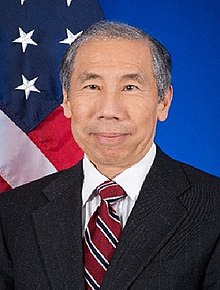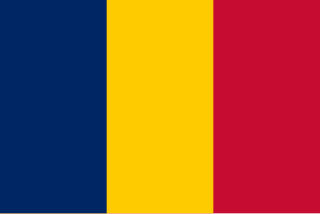
Chad, officially the Republic of Chad, is a landlocked country located at the crossroads of North and Central Africa. It is bordered by Libya to the north, Sudan to the east, the Central African Republic to the south, Cameroon to the southwest, Nigeria to the southwest, and Niger to the west. Chad has a population of 16 million, of which 1.6 million live in the capital and largest city of N'Djamena. With a total area of around 1,300,000 km2 (500,000 sq mi), Chad is the fifth-largest country in Africa and the twentieth largest nation by area in the world.
Foreign relations of Somalia are handled primarily by the President as the head of state, the Prime Minister as the head of government, and the Minister of Foreign Affairs of the Federal Government.

Idriss Déby Itno was a Chadian politician and military officer who was the 6th president of Chad from 1991 until his death in 2021 during the Northern Chad offensive. His term of office of more than 30 years makes him Chad's longest-serving president.

Seyoum Mesfin Gebredingel was an Ethiopian politician and diplomat. He was Ethiopia's Minister of Foreign Affairs from 1991 to 2010 and served as Ethiopia's Ambassador to China from 2011 to 2017.

Foreign relations of the Republic of Somaliland are the responsibility of the Ministry of Foreign Affairs of the Republic of Somaliland. The region's self-declaration of independence remains unrecognised by the international community.

The Chadian Civil War of 2005–2010 began on December 18, 2005. Since its independence from France in 1960, Chad has been swamped by civil wars between the Arab-Muslims of the north and the Sub-Saharan-Christians of the south. As a result, leadership and presidency in Chad drifted back and forth between the Christian southerners and Muslim northerners. When one side was in power, the other side usually started a revolutionary war to counter it.

Rex Wayne Tillerson is an American energy executive who served as the 69th United States secretary of state from 2017 to 2018 in the first administration of Donald Trump. From 2006 to 2016, he was chairman and chief executive officer (CEO) of ExxonMobil.

Ahmad Allam-Mi is a Chadian diplomat who has been Secretary-General of the Economic Community of Central African States since 2013. He was the Foreign Minister of Chad from 2005 to 2008, and he was Chad's Permanent Representative to the United Nations from 2008 to 2013.

Chad–United States relations are the international relations between Chad and the United States.

Somalia–United States relations are bilateral relations between the Federal Republic of Somalia and the United States of America. Somalia has an embassy in Washington, D.C., and the United States maintains an embassy in Mogadishu which was reopened in late 2019.
Mahamoud Adam Béchir is a Chadian diplomat. Previously he was Chadian Ambassador to the United States from 2004 to 2012. Currently Chads ambassador to Russia.

Sahle-Work Zewde is an Ethiopian diplomat who served as president of Ethiopia from 2018 to 2024, the first woman to hold the office. She was elected as president unanimously by members of the Federal Parliamentary Assembly on 25 October 2018.
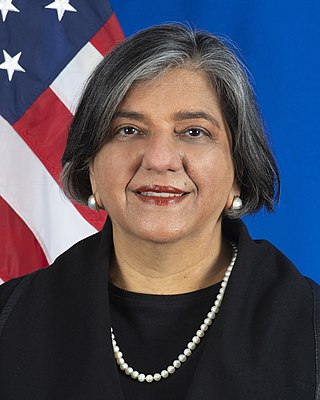
Geeta Pasi is a retired American diplomat. She was the American ambassador to Djibouti from 2011 to 2014. She was appointed American ambassador to Chad in June 2016 and served until 2018. In September 2018, she left the ambassadorship to become Principal Deputy to the Assistant Secretary of State for African Affairs.

Michael A. Hammer is an American diplomat who is serving as the United States Special Envoy for the Horn of Africa as of 2022. A career member of the United States Foreign Service, Hammer previously served as the United States ambassador to Chile from 2014 to 2016 and the United States ambassador to the Democratic Republic of the Congo from 2018 to 2022. Hammer appointed Chargé d'affaires ad interim to Cuba on November 14, 2024.
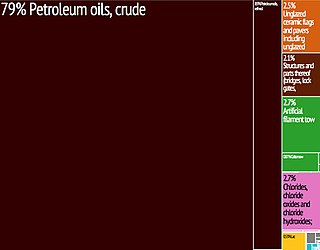
Chad maintains sizable reserves of crude oil which, alongside agriculture, makes up the largest share of the landlocked former French colony's export revenue. Producing around 100,000 barrels of oil a day, most of Chad's crude comes from its reserves in the Doba Basin in southern Chad where oil was discovered in the early 1970s by foreign drillers. There is an estimated one billion barrels of oil in Chad, most of it being exploited by hundreds of rigs operated by Western companies such as ExxonMobil and Shell. However, many challenges exist to Chad's petroleum industry including but not limited to corruption, internal conflict, and geography. Since Chad is landlocked, most of Chad's oil exports are transported out of the country by a pipeline that leads to the Cameroonian port city of Kribi. This pipeline, owned by a consortium, has come under fire due to allegations of exploitation by international corruption watchdogs, and Chadian politicians. In addition, environmentalists have voiced their concerns over the pipeline's impact on the natural environment, citing several spills.
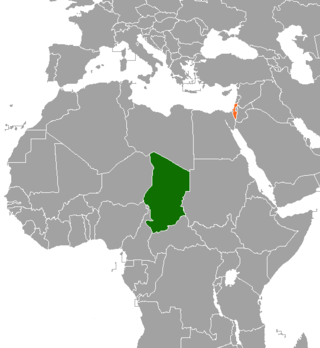
Chad and Israel began relations with Chad's independence in 1960, but were officially terminated in the 1970s. De facto relations resumed in 2016, with diplomatic relations re-established in 2019.

Carlos Alfredo Vecchio DeMari is a Venezuelan lawyer, politician and social activist, designated as Ambassador to the US by Juan Guaidó in January 2019 during the 2019 Venezuelan presidential crisis. His credential letter was accepted by U.S. President Donald Trump on 9 April 2019.

Hinda Déby Itno is a Chadian former First Lady who served from 2005 until the death of her husband, President Idriss Déby, in April 2021.
